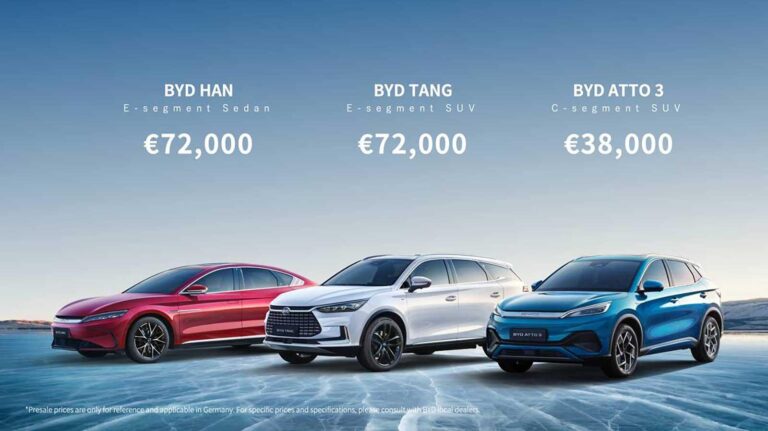Thailand’s ambitious push to become a leading electric vehicle (EV) manufacturing hub is facing mounting challenges as fierce competition among Chinese automakers intensifies within its borders. Industry insiders and government officials alike are closely watching how the influx of well-established Chinese EV brands is reshaping the local market-and testing Bangkok’s strategic plans to boost domestic production and reduce reliance on imports. This evolving rivalry underscores the broader dynamics at play in Southeast Asia’s fast-growing EV sector, where global players vie for dominance amid shifting trade policies and technological innovation.
China’s EV Competition Challenges Thailand’s Automotive Ambitions
China’s rapidly expanding electric vehicle (EV) industry is putting unprecedented pressure on Thailand’s ambitions to become a regional manufacturing hub. With Chinese automakers aggressively scaling production and leveraging cost advantages, Thai manufacturers face formidable challenges in securing market share both domestically and within the ASEAN bloc. The influx of affordable and technologically advanced Chinese EV models threatens to overshadow Thailand’s burgeoning local EV brands, undermining years of government incentives aimed at boosting local production capacity.
Industry analysts highlight several critical factors contributing to this competitive imbalance:
- Economies of scale: Chinese firms benefit from extensive supply chains and massive production volumes, cutting costs dramatically.
- Technological innovation: Continuous improvements in battery technology and vehicle software are largely spearheaded by Chinese companies.
- Government backing: China’s robust policy framework provides export support and R&D subsidies, accelerating global market penetration.
| Aspect | China’s Strength | Thailand’s Challenge |
|---|---|---|
| Production Scale | Over 6 million EVs/year | Under 200,000 EVs/year |
| Battery Manufacturing | Largest global lithium-ion battery supplier | Dependence on imports |
| Technological R&D | Strong government & private investment | Limited R&D infrastructure |
Impact of Chinese Electric Vehicle Giants on Thailand’s Manufacturing Sector
Chinese electric vehicle (EV) giants are increasingly reshaping Thailand’s manufacturing landscape, challenging the Kingdom’s ambition to become a regional EV hub. These companies bring aggressive investment strategies, advanced technological expertise, and established supply chains that outperform many local players. Their entry into Thailand is intensifying competition with domestic manufacturers, forcing them to accelerate innovation and cost-efficiency efforts. However, this rivalry also highlights gaps in local capabilities, especially in high-value component production.
Key effects on Thailand’s manufacturing sector include:
- Increased pressure on local firms to upgrade production standards and embrace Industry 4.0 technologies.
- Emerging partnerships and joint ventures between Chinese companies and Thai suppliers, boosting knowledge transfer.
- Greater emphasis on developing a comprehensive EV supply chain that incorporates battery production, semiconductors, and software.
| Factor | Chinese EV Giants | Thai Manufacturers |
|---|---|---|
| Investment Scale | High and Rapid | Moderate, Cautious |
| Technology Access | Advanced & Integrated | Developing |
| Supply Chain | Strong & Comprehensive | Fragmented, Emerging |
| Market Impact | Expanding Quickly | Growing Slowly |
Strategies for Thailand to Strengthen Local Production Amid Foreign Pressure
Facing mounting competition from China’s aggressively expanding electric vehicle (EV) industry, Thailand must adopt multi-faceted approaches to safeguard and enhance its domestic manufacturing capabilities. Central to these efforts is investing heavily in advanced technology and innovation hubs to transition from traditional automotive assembly lines to smart production facilities. This includes fostering public-private partnerships that emphasize research and development in battery technology, autonomous driving, and sustainable materials, positioning Thailand as a hub for next-generation automotive components rather than just low-cost manufacturing.
Moreover, policy measures aimed at boosting local content requirements and incentivizing domestic suppliers play a crucial role. The Thai government could introduce targeted subsidies and tax breaks to encourage investments in homegrown parts and raw material production. Strategic workforce development programs designed to upskill local labor, combined with streamlined regulatory frameworks, will further enhance competitiveness. Below is a snapshot of potential strategic initiatives worth consideration:
| Strategy | Purpose | Expected Outcome |
|---|---|---|
| Innovation Grants | Boost R&D in EV tech | Higher tech value addition |
| Local Supplier Mandates | Increase domestic sourcing | Supply chain resilience |
| Skills Training Programs | Upskill workforce | Improved productivity |
| Tax Incentives | Attract investment | Expanded manufacturing base |
To Wrap It Up
As China’s leading electric vehicle manufacturers deepen their competition in Thailand, the outcome will be pivotal for the country’s aspirations to become a regional EV production hub. While local authorities remain committed to fostering domestic industry growth, the intense rivalry among foreign players poses both opportunities and challenges for Thailand’s automotive sector. How Bangkok navigates this complex landscape will significantly influence the future of EV manufacturing and market dynamics in Southeast Asia.



